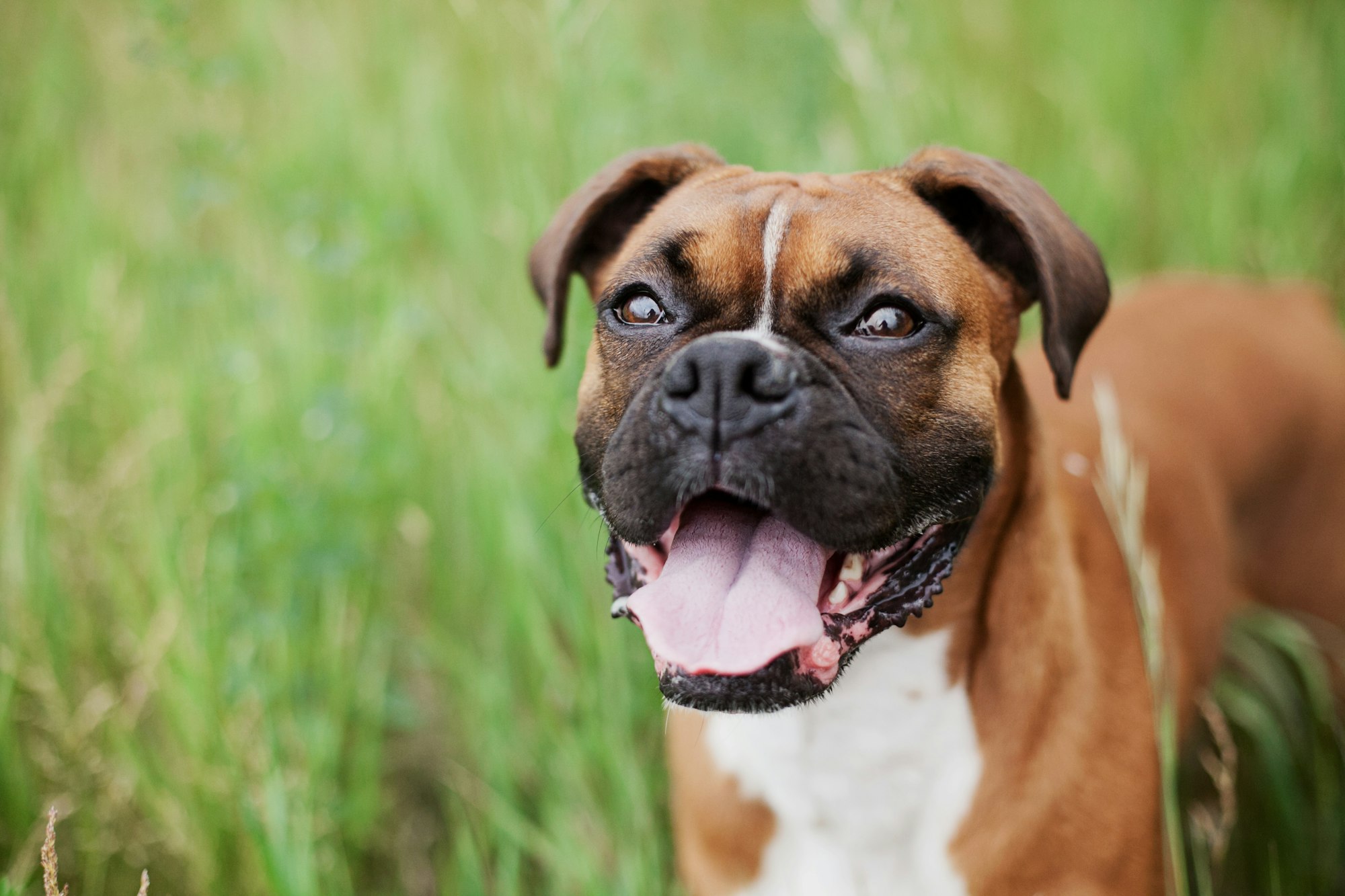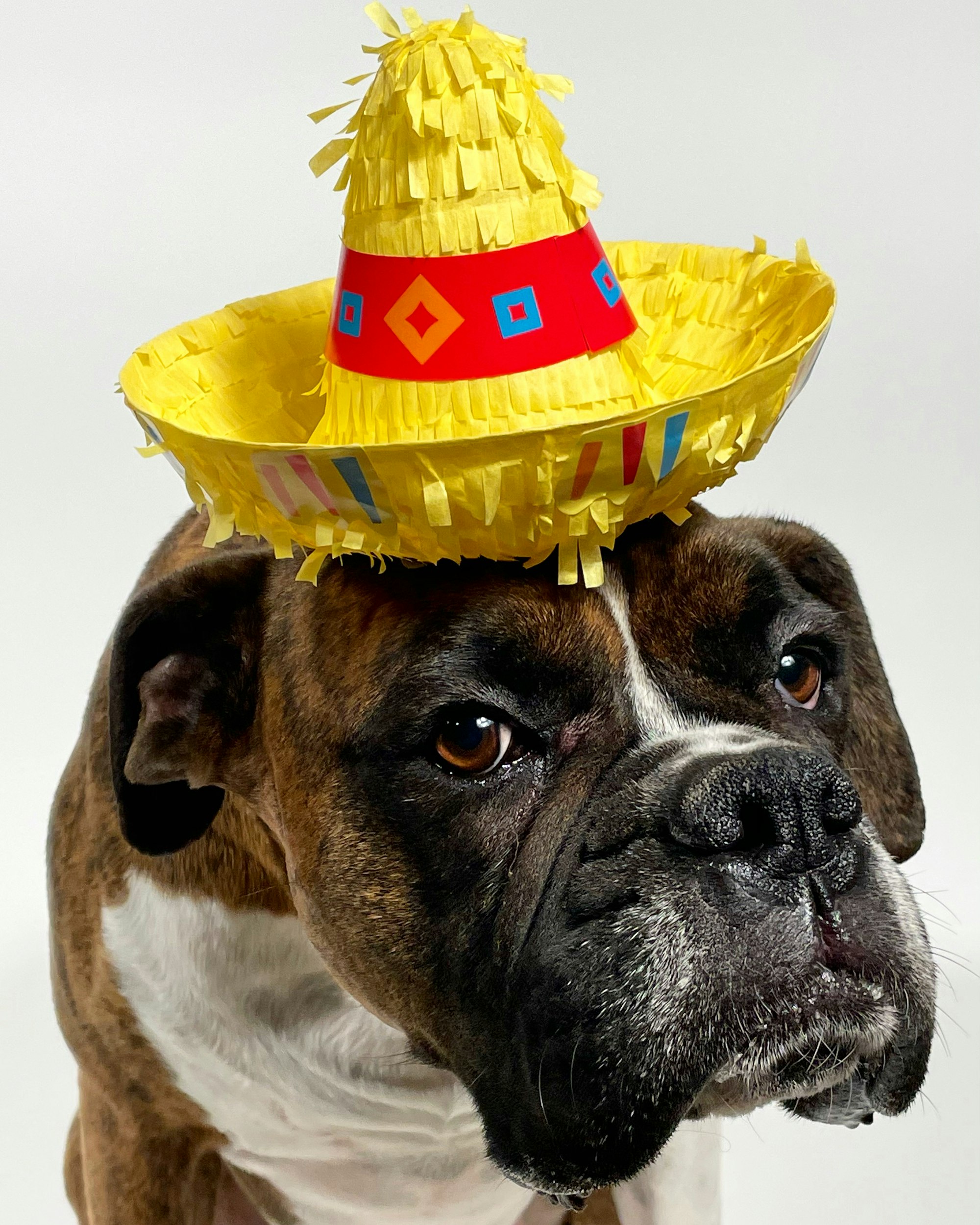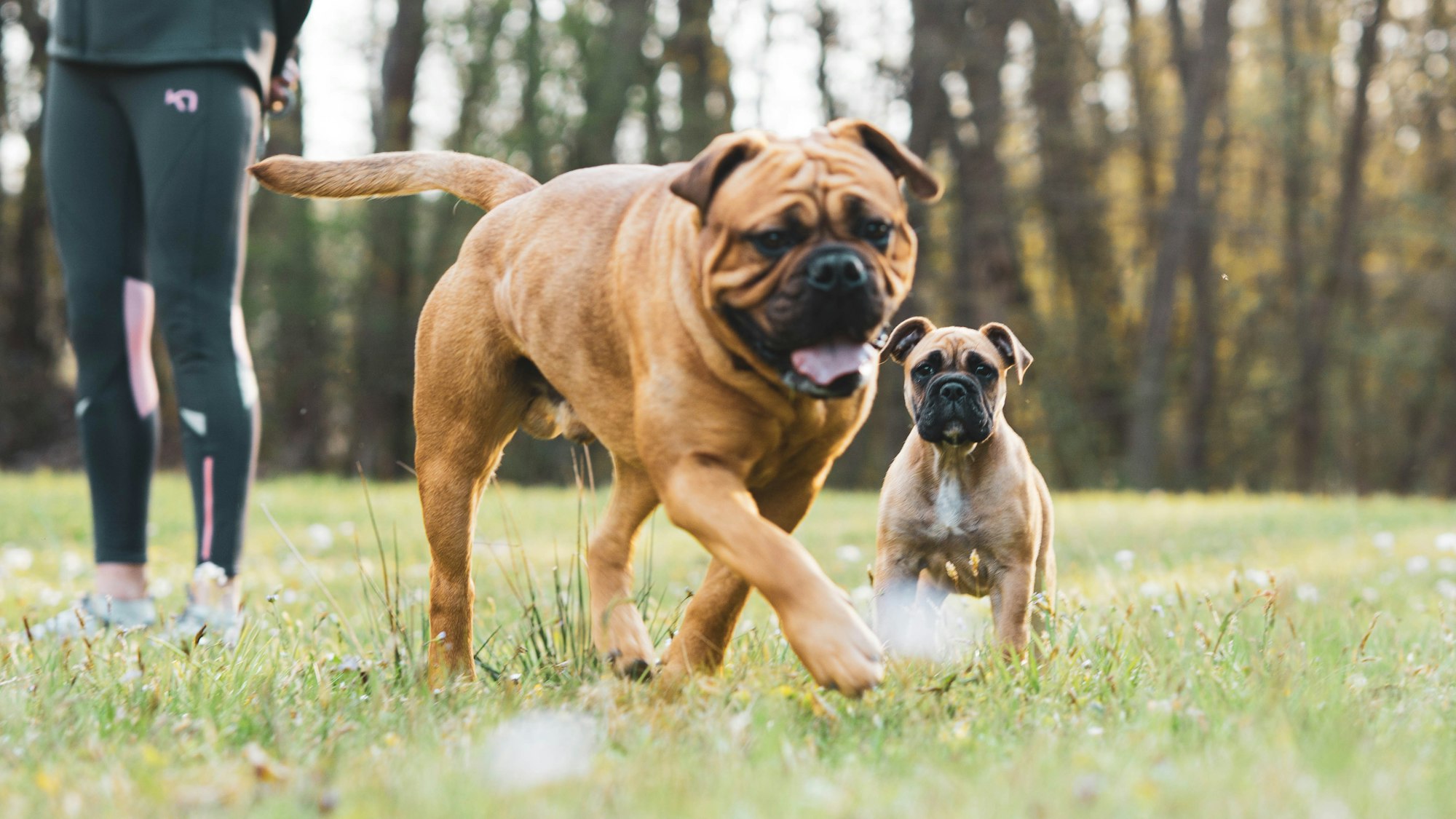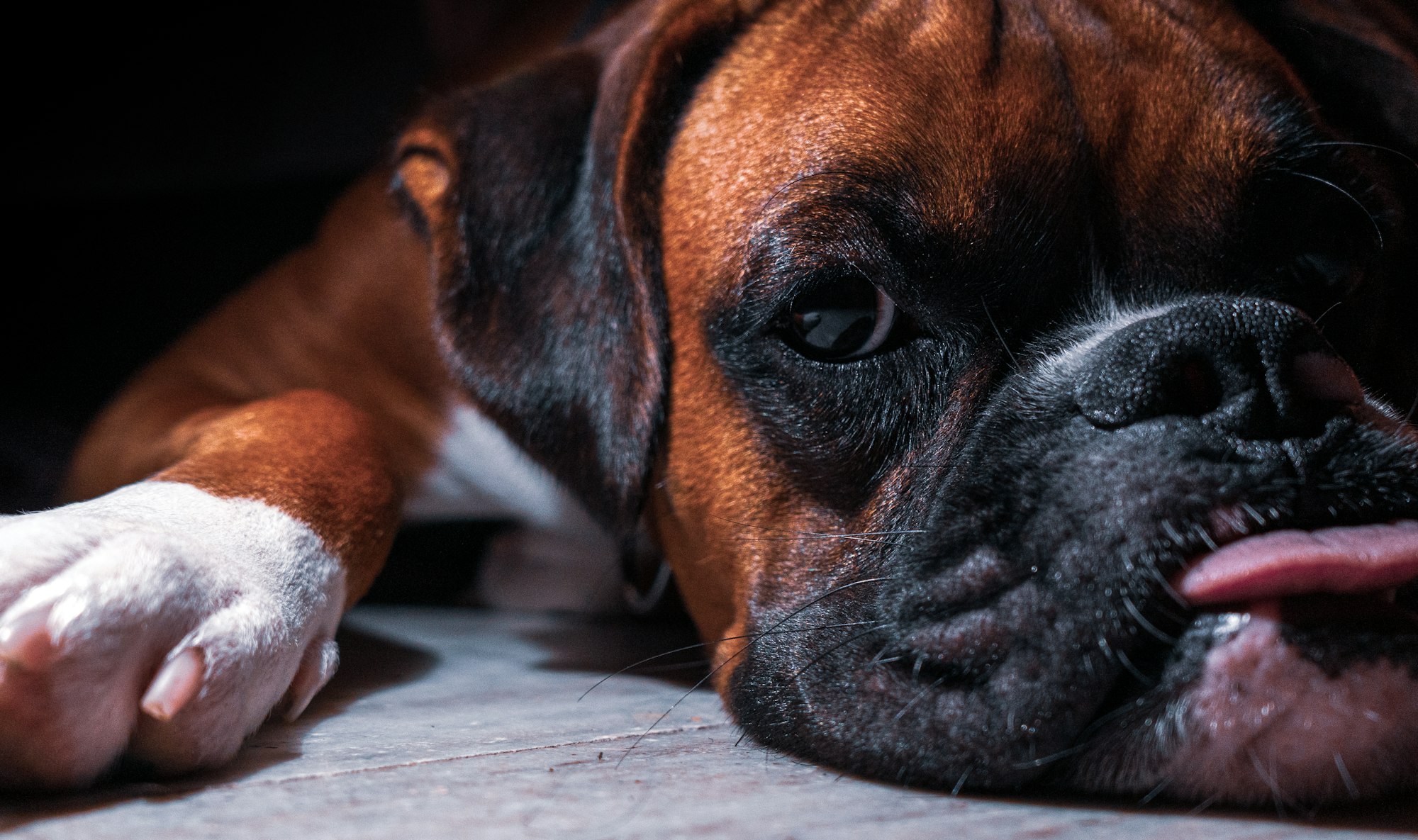In the realm of canine companionship, few breeds manage to capture the hearts of dog enthusiasts quite like the Boxer. With their distinct appearance, boundless energy, and unwavering loyalty, Boxer dogs have earned a special place in the hearts of families around the world. In this guide, we will delve into the fascinating world of Boxer dogs, exploring their history, characteristics, care requirements, and more.

Origins and History of Boxer Dogs
Ancient Ancestry and European Roots
The history of Boxer dogs traces back to ancient times when their ancestors served as hunting and utility dogs in Europe. These dogs were known for their strength and agility, traits that would later define the Boxer breed. The modern Boxer, as we know it today, can be attributed to 19th-century Germany, where they were developed by crossing various breeds like Bulldogs and Mastiffs.
Development of the Modern Boxer Breed
By selectively breeding dogs with desirable traits, breeders crafted the Boxer into a versatile working breed. They were employed as guard dogs, cattle herders, and even circus performers due to their intelligence and adaptability. Over time, Boxers transitioned into beloved family pets, captivating hearts with their charming personalities and unique appearance.
Distinctive Physical Traits
Muscular Build and Energetic Stature
Boxers are renowned for their well-muscled bodies and energetic demeanor. They possess a sturdy frame that exudes power and athleticism. Their sleek coat, often fawn or brindle, adds to their striking appearance, making them stand out in any crowd.
Signature Boxer Head and Expressive Eyes
One of the most iconic features of Boxer dogs is their distinct head shape. Their short muzzle and strong jawline give them an endearing appearance, accentuated by their soulful, expressive eyes that radiate warmth and curiosity.
Weight Range
The weight of a Boxer can vary depending on factors such as gender, genetics, and overall health. On average, male Boxers typically weigh between 65 to 80 pounds (29.5 to 36.3 kilograms), while females generally weigh around 50 to 65 pounds (22.7 to 29.5 kilograms). It's significant to note that some Boxers might fall slightly above or below these ranges while still being perfectly healthy.

Achieving and Maintaining a Healthy Weight
Maintaining an ideal weight is crucial for a Boxer's overall well-being. An unhealthy weight can lead to various health issues, including joint problems and obesity-related complications. To ensure your Boxer is at a healthy weight, regular exercise, and a balanced diet are essential.
Growth Phases
Boxers, like all dogs, go through growth phases. It's essential to be mindful of these stages to provide appropriate nutrition and prevent overfeeding during rapid growth. Puppy Boxers can experience rapid growth until around 12 to 18 months of age. During this time, their dietary needs may change, requiring adjustments to portion sizes and feeding frequency.
A Temperament That Warms Hearts
Playful Nature and Infectious Enthusiasm
Boxer dogs have an innate zest for life that's hard to ignore. Their boundless energy and playful antics can light up a room, turning the dullest moments into joyful experiences. Whether it's fetching a ball or engaging in a spirited game of chase, Boxers are always up for fun.

Loyal Companionship and Protective Instincts
Beyond their playful demeanor, miniature boxers are fiercely loyal and protective of their families. They form deep bonds with their human counterparts and are known for their unwavering devotion. This loyalty, coupled with their natural guarding instincts, makes them excellent watchdogs.
Boxers as Family Members
Welcoming Boxers into Your Home
Bringing a Boxer into your home is akin to adding a new member to the family. Their affectionate nature and exuberant personality make them wonderful companions for families of all sizes.
Building Strong Bonds with Children and Other Pets
Boxers have an innate affinity for children, often displaying a gentle and patient demeanor around them. Their playful spirit shines through when interacting with kids, making them ideal playmates. Additionally, with proper socialization, Boxers can coexist harmoniously with other pets in the household.
Training and Exercise Regimen
Mental Stimulation for an Intelligent Breed
Boxers possess a high level of intelligence that requires regular mental stimulation. Engaging them in activities like puzzle toys, obedience training, and interactive games can help channel their smarts in positive ways.
Physical Activities to Channel High Energy
Due to their energetic nature, Boxers thrive on physical activities that challenge them both mentally and physically. Regular exercise through brisk walks, jogging, and playtime not only keeps them fit but also prevents boredom-related behaviors.
Grooming and Healthcare
Coat Care and Minimal Shedding
Boxers boast a short coat that requires minimal grooming. A weekly brush helps keep their coat shiny and removes loose hairs. Despite shedding year-round, their coat maintenance is relatively straightforward.
Common Health Concerns and Preventive Measures
While generally robust, Boxers are susceptible to certain health issues such as hip dysplasia and heart conditions. Regular veterinary check-ups, a balanced diet, and regular exercise can contribute to their overall well-being.
Boxer Nutrition and Diet
Tailoring a Balanced Diet to Support Vitality
A nutritious diet is essential to support a Boxer's active lifestyle. High-quality dog food that provides the right balance of proteins, fats, and carbohydrates helps maintain their energy levels and promotes muscle health.
Feeding Guidelines and Special Dietary Considerations
Consulting with a veterinarian can help determine the appropriate feeding schedule and portion sizes for your Boxer. Special dietary considerations may be necessary based on age, activity level, and any existing health conditions.

Socialization and Interaction
Nurturing Proper Social Skills from Puppyhood
Early socialization is crucial for Boxers to develop well-rounded and confident personalities. Exposing them to various people, environments, and situations during their formative months can help prevent shyness or behavioral issues.
Encouraging Positive Encounters with Strangers
Boxers' natural protective instincts can sometimes lead to wariness around strangers. Positive reinforcement training and controlled introductions can help them feel more at ease when meeting new people.
Boxer-Proofing Your Home
Creating a Safe Environment for Curious Pups
Boxers are curious by nature and may explore their surroundings with unbridled enthusiasm. Puppy-proofing your home by removing potential hazards and providing appropriate toys can ensure pet safety and prevent accidents.
Managing Boxer Traits to Prevent Unwanted Behavior
Boxers' exuberance can sometimes lead to unwanted behaviors like jumping or chewing. Consistent training, using positive reinforcement techniques, can help mold their behavior and curb undesirable habits.
Engaging Activities for Boxers
Interactive Toys and Mental Challenges
Stimulating Boxers mentally is as important as physical exercise. Interactive dog toys, treat puzzles, and engaging games help keep their minds sharp and prevent boredom-related mischievousness.
Agility and Obedience Training for a Fulfilling Bond
Enrolling your Boxer in agility and obedience classes offers a dual benefit – it enhances their discipline and strengthens the bond between you and your furry friend. These activities tap into their intelligence and natural athleticism.
Travel and Adventures with Your Boxer
Boxer-Friendly Destinations and Activities
Planning trips that incorporate dog-friendly destinations and activities can make for memorable adventures with your Boxer. Hiking trails, beaches, and parks where they can run freely allow them to share in your explorations.
Tips for Stress-Free Traveling with Your Furry Friend
When traveling with your Boxer, ensure they have a comfortable space, ample water, and regular breaks. Familiar items like their bed or favorite toy can provide reassurance in unfamiliar environments.

Boxer Health and Aging
Senior Care for Aging Boxers
As Boxers age, their care requirements evolve. Regular veterinary check-ups, a balanced diet tailored to their changing needs, and low-impact exercise help them maintain a healthy and happy life in their senior years.
Enhancing Quality of Life in the Golden Years
Adapting their environment to accommodate potential mobility issues and providing companionship can greatly enhance the quality of life for senior Boxers. Regular interaction and mental stimulation remain essential even as they age.
Addressing Common Misconceptions
Separating Myths from Facts about Boxer Dogs
Boxers have faced their fair share of misconceptions, often being inaccurately labeled as aggressive or difficult to train. In reality, Boxers' temperament is shaped by responsible breeding and proper training, and they can be incredibly loving and well-behaved companions.
Dispelling Notions About Aggression
While Boxers' protective nature may be misunderstood as aggression, early socialization, and consistent, positive training play a vital role in preventing aggressive behavior. Boxers are naturally inclined to protect their families, making them excellent watchdogs.
Boxer Roles in Society: Beyond the Backyard
Boxer dogs are more than just delightful companions; they have also carved out significant roles in various facets of society. Their unique blend of intelligence, loyalty, and versatility makes them valuable assets in diverse roles. In this section, we'll explore the different roles that Boxer dogs play in society, showcasing their remarkable abilities and contributions.
Service and Assistance Dogs
Boxers' intelligence and willingness to learn have made them excellent candidates for service and assistance roles. They are trained to provide vital support to individuals with disabilities, such as guide dogs for the visually impaired or service dogs for those with mobility challenges. Boxers' adaptability and calm demeanor make them well-suited for these crucial roles.

Search and Rescue Heroes
When disaster strikes, Boxer dogs often step up as search and rescue heroes. Their acute sense of smell and agility enable them to locate missing persons in challenging environments. Whether it's searching for survivors in rubble or locating lost hikers, Boxers' dedication and determination make them invaluable assets in search and rescue operations.
Therapy and Emotional Support
Boxers' innate empathy and gentle nature make them wonderful therapy dogs and emotional support animals. They provide comfort and companionship to individuals in hospitals, nursing homes, and other care facilities. Their presence has been shown to alleviate stress and promote emotional well-being, making them cherished visitors in various therapeutic settings.
Canine Sports and Competitions
Boxers' boundless energy and enthusiasm shine in the realm of canine sports and competitions. They excel in agility, obedience, and even competitive obedience trials. Their love for engaging activities and their desire to please their owners make them top contenders in various dog sports, showcasing their athleticism and versatility.
Entertainment and Media
Boxer dogs' striking appearance and charismatic personalities have not gone unnoticed in the world of entertainment and media. They have graced the silver screen, appearing in movies and commercials, and have become social media sensations with their playful antics and heartwarming moments. Their ability to capture hearts through screens is a testament to their innate charm.
Community Ambassadors
Boxer dogs often serve as community ambassadors, participating in outreach programs and events that promote responsible pet ownership and animal welfare. Their friendly demeanor and approachable nature help bridge the gap between humans and animals, fostering positive relationships and spreading awareness about responsible pet care.
Conclusion
In the grand tapestry of dog breeds, Boxers stand out as loyal, affectionate, and endlessly entertaining companions. Their unique blend of energy, intelligence, and devotion makes them an ideal choice for families seeking a vibrant and loving addition to their household.
As you embark on this journey with your Boxer, you're embarking on a voyage of love, loyalty, and laughter. The unbreakable bond you'll forge with your furry friend is a testament to the remarkable connection that exists between humans and dogs.
FAQs
Q1: Are Boxers suitable for apartment living?
A: While Boxers have high energy levels, they can adapt to apartment living if provided with ample exercise and mental stimulation.
Q2: Do Boxers get along with other pets?
A: Yes, with proper socialization, Boxers can coexist harmoniously with other pets, including cats and other dogs.
Q3: Are Boxers good with children?
A: Boxers are known for their gentle and patient nature around children, making them great family dogs.
Q4: How often should I groom my Boxer?
A: Boxers have short coats that require minimal grooming; a weekly brush is generally sufficient.
Q5: Do Boxers have any common health issues?
A: Boxers can be prone to certain health conditions like hip dysplasia and heart conditions, but regular vet check-ups and a healthy lifestyle can mitigate these risks.
Want more info on the Boxer? Check out these articles:










